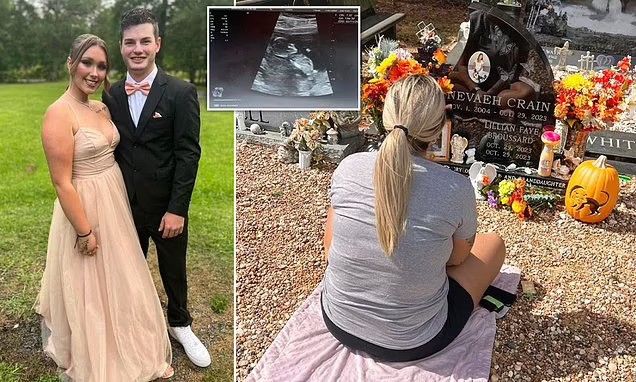A pregnant Texas teenager died an agonizing death from sepsis after doctors refused to abort her fetus even after she began to miscarry.
Navaeh Crain, 18, visited the ER three times and had to wait 20 hours before she was admitted.
The expectant mom had woken up on the day of her baby shower with nausea and vomiting, which turned out to be a deadly infection.
But she had to plead for medical assistance, with doctors waiting to perform two ultrasounds to confirm her fetus had no heartbeat before they would intervene.
She is one of at least two pregnant women who have died after doctors delayed treating miscarriages due to Texas’ strict abortion laws, according to a report by ProPublica.

Experts told the publication that there was ‘no medical reason’ to make Crain wait for two ultrasounds before taking action to save her.
They identified several missed opportunities, which began when she arrived at the first hospital and was misdiagnosed with strep.
When she went to another hospital she screened positive for sepsis, but as her fetus still had a heartbeat, she was discharged.
The experts said that if the sepsis was in Crain’s uterus, it was likely that she would need an abortion to prevent the spread.
Instead, she returned to the home she shared with her mom in Vidor despite being so weak she could not walk.
But hours later, Crain began to panic when she went to the bathroom and found her underwear covered in blood.
She and her mom raced back to Christus Southeast Texas St. Elizabeth hospital along with her boyfriend and fetus’ father, Randall Broussard.
By this point Crain was weak and her lips drained of all color. An ultra sound by the obstetrician on duty Dr. Marcelo Totorica confirmed Crain’s worst fears – her fetus, had no heart beart.


While standard protocol would be to prepare for delivery, nurses were given instructions not to move Crain, according to medical notes.
Totorica ordered a second ultra sound which again confirmed the absence of a fetal heartbeat.
‘She was bleeding,’ Crain’s heartbroken mom Candace Fails said. ‘Why didn’t they do anything to help it along instead of wait for another ultrasound to confirm the baby is dead?’
By this point Crain was too weak to sign her own release form and Fails had to fill out the paperwork permitting doctors to abort.
The move came almost two and half hours after her daughter was admitted and more than 20 since she first sought help.
But tragically, it was too late and doctors deemed it too risky to operate. Crain died in ‘extreme pain’ with black blood gushing from her nostrils and mouth.
Fails was faced with the agony of losing not only her daughter but her future granddaughter, who the couple had named Lillian.
‘I know it sounds selfish, and God knows I would rather have both of them, but if I had to choose, I would have chosen my daughter,’ Fails said.

She has tried and failed to get her daughter’s case taken up by medical negligence lawers, even though Totorica was previously disciplined for missing infections in other patients.
Texas abortion laws forbid doctors from carrying out abortions once a fetal heartbeat is detected, unless the life of the mother is in danger.
But murky wording around the legislation has led some medics to delay care for fear of being prosecuted, fined or having their license revoked, both very real consequences for violators of the law.
Women’s rights activists point to the death of women such as Crain as evidence that the law is harming mothers.
It comes after it emerged a pregnant Texas mom Josseli Barnica died in 2021 after doctors failed to provide her appropriate care during her miscarriage at 17 weeks.
Medics were reluctant to deliver her fetus which led to her contracting a fatal infection in her cervix.
‘CHRISTUS St. Elizabeth believes that the care provided to this patient was at all times appropriate and compassionate,’ a spokeswoman said.
‘However, due to HIPAA and privacy, we cannot comment further. Christus Southeast Texas St. Elizabeth hospital for comment.’
Last modified: November 13, 2024


